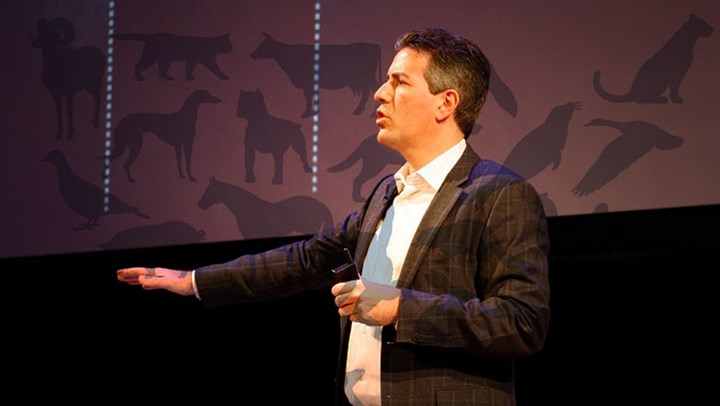
by Frank Miniter - Friday, February 16, 2018

Wayne Pacelle once tried to get me fired. He tried this after I wrote a story for the NRA’s American Hunter magazine about what’s really in the bowels of the Humane Society of the United States’ (HSUS) headquarters in Washington, D.C.
Now, a dozen years later, it’s amusing to watch Pacelle succumb to his own nature. He took the head job at HSUS, the largest anti-hunting group in the world, in 2004 after working for nearly 10 years as the organization's chief lobbyist and spokesperson. He was forced to resign on Feb. 2 after accusations of sexual harassment against him by HSUS employees surfaced.
In 2005 I had the audacity to knock on HSUS’ door in downtown D.C. It’s a five- or six-story glass building located at 2100 L Street, N.W., in the West End neighborhood of Washington, D.C.
HSUS didn’t have a receptionist out front. A person working with the Sierra Club’s Earthjustice Legal Defense Fund, which at the time rented office space from HSUS—a telling sort of thing—opened the door for me. I explained I was a journalist visiting Washington, D.C., and wanted to meet with HSUS.
The kind lady with Earthjustice told me that all of HSUS’ big wigs have their offices in Maryland, but if I just took an elevator down a floor I could meet the personnel they have at what they called their headquarters.
The elevator went down and the door opened in a dimly lighted hall. I stepped out and met a young man who was the head of a small team of college-age kids who were all busy stuffing envelopes with HSUS propaganda. We talked for a while, but they didn’t have much to say. Most were volunteers or interns.
I left with a bundle of their propaganda in my hands after some curious conversations with them. None of them expressed deep convictions about HSUS’ causes. They all seemed to think interning there would be good on their resumes.
So yes, I’d found out firsthand that the heart and soul of HSUS’ HQ was a propaganda machine. This was hardly surprising, but still very amusing.
HSUS, after all, is a radical animal-rights extremist group that fronts as a mainstream nonprofit that has or supports animal shelters. HSUS, however, doesn’t run animal shelters. Sure, HSUS likes to put cute and sad photos of puppies and kittens on its fundraising materials and television commercials, but HSUS actually gives less than 2 percent of the millions of dollars it raises annually to spay/neuter programs or to take in stray or abused pets.
Pacelle has long used this ruse, with help from the so-called mainstream media, to fool a lot of Americans into donating to them.
Long before Pacelle got the head job at HSUS, Ted Kerasote interviewed him for his 1994 book “Bloodties: Nature, Culture, and the Hunt.” In it Pacelle was quoted saying several things from which he later would try to distance himself.
Kerasote asked, “[W]ould you let people hunt for food if they did it respectfully?” Pacelle answered, “Well, it’s a good question. I think that I would campaign against it. Yes, I think that I would.”
“How about pets, Wayne? Would you envision a future with no pets in the world?” asked Kerasote. Pacelle answered, “I wouldn’t say that I envision that, no. If I had my personal view perhaps that might take hold. In fact, I don’t want to see another cat or dog born. It’s not something I strive for, though. If people were very responsible, and didn’t do manipulative breeding, and cared for animals in all senses, and accounted for their nutritional needs as well as their social and psychological needs, then I think it could be an appropriate thing. I’m not sure. I think it’s one of those things that we’ll decide later in society. I think we’re still far from it.”
Pacelle would go on to raise millions upon millions of dollars via disingenuous advertising. He would have some success stopping dove hunts and trapping in a few states with a few other attacks on sportsmen. But he would spend the majority of his ill-gotten millions attacking ranchers, poultry farmers, research labs, zoos and circuses.
Pacelle is a vegan, which is his choice. The trouble is he wants to force his views on the rest of us even when they are harmful to wildlife, pets and more.
After I visited his HQ and wrote that the heart and soul of HSUS is a mail-processing center, a propaganda machine, Pacelle actually sent a letter to the NRA. He personally attacked me and, I suppose, hoped his complaint would get me fired or at least reprimanded. I didn’t do anything dishonest, but just reported on what I saw. I didn’t even lie or deceive the HSUS employees I met. I just told them I was a journalist. So, of course, the NRA had no problem with my conduct.
Now Pacelle, a deceiver, manipulator and self-righteous charlatan, is the latest casualty of this important #MeToo moment after he allegedly sexually harassed three female subordinates at HSUS. Surprise isn’t what I feel about this; no, a person’s character has a way of crossing from their professional to their personal lives.
■ ■ ■
Editor's Note: Frank Miniter is the author of "This Will Make a Man of You: One Man’s Search for Hemingway and Manhood in a Changing World." Miniter is also the author of the New York Times' Bestseller "The Ultimate Man’s Survival Guide," as well as "The Future of the Gun" and “The Politically Incorrect Guide to Hunting.”
E-mail your comments/questions about this site to:
[email protected]
